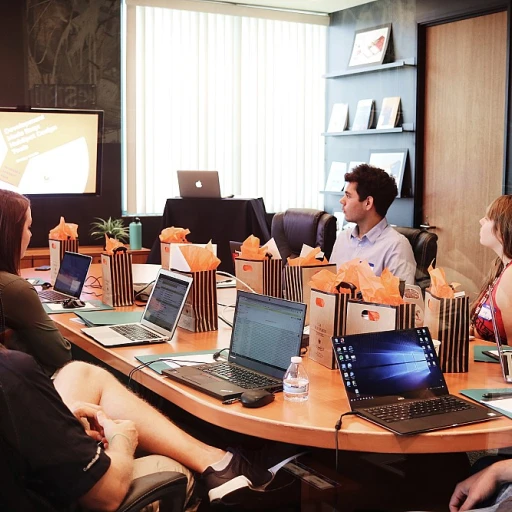
Understanding the Role of a Talent Management Coordinator
The Impact of a Talent Management Coordinator
The role of a talent management coordinator is evolving rapidly within the industry, particularly in bustling areas like New York City and Los Angeles. As brands increasingly seek collaboration with influencers and creators the position has grown more complex, demanding a mix of management skills and an understanding of social media dynamics.
At its core, an effective coordinator helps bridge the gap between creators and brand partnerships, guiding projects from concept to completion. This involves multitasking across administrative duties, including serving as an administrative assistant where needed, and acting as a liaison between talent and management. The coordinator is integral in supporting talent managers and ensuring that contracts and collaborations align with the creator’s brand identity.
Key Responsibilities in Talent Management
The day-to-day responsibilities of a talent management coordinator typically include:
- Overseeing brand negotiation logistics and timelines.
- Keeping abreast of evolving influencer marketing trends to optimize social media strategies.
- Providing support in talent development and growth strategies within management agency settings.
- Liaising with different departments and assisting talent managers as necessary.
Elevating the role requires understanding not only the logistics of influencer management and project outcomes but also fostering strong, long-term relationships with the talent agency. Successful coordinators often employ a mix of innovative technology solutions and traditional communication techniques to achieve optimized results.
Learn more about the intricacies of this position by visiting this resource on understanding the role of a human resources director, enhancing your analytical approach to this key role.
Strategies for Effective Talent Management
Implementing Efficient Talent Management Approaches
Coordinating talent management for creators and influencers requires a strategic approach to ensure the success and growth of both the talent and the brands they collaborate with. Influencer management demands a solid understanding of industry nuances and the ability to navigate complex relationships.- Integration of Tailored Solutions: A one-size-fits-all strategy rarely works in talent management. Successful talent managers need to customize their strategies to cater to the individual needs and skills of each creator or influencer. This approach not only helps in bringing out the best in the talent but also aligns their goals with business objectives.
- Effective Time Management: With influencers often juggling multiple commitments, efficient time management is crucial. A talent coordinator should prioritize tasks and delegate responsibilities where necessary, even employing an administrative assistant if needed, to maintain seamless operations.
- Ensuring Consistent Development: Continuous development of skills is vital in the rapidly evolving world of social media and influencer marketing. Talent managers should facilitate professional growth through workshops, feedback sessions, and encouraging collaboration with other media influencers.
- Fostering Brand Partnerships: Building strong brand partnerships is a core aspect of influencer talent management. By aligning the influencer’s niche with brands that share similar values, both parties can benefit from mutually rewarding relationships.
Challenges in Managing Creators and Influencers
Obstacles in Guiding Creators and Influencers
Managing creators and influencers comes with its unique set of challenges. As talent managers, it is critical to navigate these complexities to maintain effective talent management practices. In today's digital-first world, media influencers are not only shaping public opinion but are also crucial for brand partnerships. This elevates the role of a talent management coordinator to new heights, especially in bustling hubs like York City or Los Angeles.
Firstly, there's the challenge of time management. Creators and influencers lead fast-paced lives, often juggling multiple projects at once. It's the manager's job to ensure that deadlines are met while keeping the workload balanced. This requires active communication and precise scheduling skills, often demanding long-term planning and a keen eye for detail. The involvement of an administrative assistant might be essential here.
Brand alignment is another hurdle. Coordinators must ensure that the talents' brand resonates with business partners' needs. This task involves thorough knowledge of both parties' marketing objectives and media presence. This ensures that influencers, agencies, and brands are working towards a common goal.
The dynamic nature of influencer marketing also poses a challenge. Trends on social media evolve swiftly. Thus, a talent management professional must remain agile and informed about the latest in the industry. Keeping up with these trends while managing a portfolio of talents requires a talent manager to be constantly learning and adapting.
Finally, there is the significant hurdle of maintaining relationships. In a job where turnover can be high, developing trust and long-term rapport with talents is crucial. This involves clear communication, honesty, and fulfilling promises made to the talents. A talent manager should also be prepared to act as a mediator when conflicts arise or terms of engagement need to be clarified.
To address many of these challenges, leveraging technology and embracing innovative solutions have proven effective. By enhancing talent management through effective business-to-business newsletters, managers can streamline communications and foster better alignment within the industry.
Building Strong Relationships with Talent
Fostering Trust and Communication
In the dynamic world of talent management, particularly when dealing with creators and influencers, building strong relationships is paramount. A talent manager must prioritize trust and open communication. This is crucial not only for the smooth functioning of day-to-day operations but also for long-term success. Effective communication ensures that both the talent and the management agency are aligned in their goals and expectations.
Understanding Individual Needs
Each influencer or creator is unique, with distinct aspirations and challenges. A successful talent coordinator in a bustling city like New York or Los Angeles must be adept at understanding these individual needs. This involves regular check-ins and personalized strategies that cater to the specific goals of each talent. By doing so, talent managers can foster a supportive environment that encourages growth and development.
Collaborative Goal Setting
Collaborative goal setting is another critical aspect of relationship building. Talent managers should work closely with their clients to set realistic and achievable goals. This collaborative approach not only empowers the talent but also ensures that the management agency is effectively supporting their journey. It’s a partnership that requires commitment from both sides, and when done right, it can lead to successful brand partnerships and influencer marketing campaigns.
Leveraging Social Media for Engagement
In today’s digital age, social media plays a pivotal role in talent management. It’s not just a platform for marketing; it’s a tool for engagement and relationship building. Talent managers should encourage their clients to actively engage with their audience, as this can significantly enhance their brand presence. Moreover, social media provides valuable insights into audience preferences, which can be leveraged to tailor content and strategies effectively.
Consistency and Reliability
Finally, consistency and reliability are the cornerstones of strong relationships in talent management. A talent manager must be a reliable point of contact, ensuring that any issues or concerns are addressed promptly. This reliability builds trust, which is essential for maintaining long-term relationships with talent. In the fast-paced world of media influencers, where time is of the essence, being dependable can set a talent agency apart from the competition.
Leveraging Technology in Talent Management
Tech Tools Revolutionizing Talent Management
In the dynamic worlds of creators and media influencers, effective management requires embracing technology. The swift pace of social media and constant content generation means talent managers must utilize the best tools available to streamline processes and maximize efficiency. Modern technology aids managers in handling the multifaceted aspects of their role, whether they're located in New York City or Los Angeles. Here’s how leveraging technology can enhance the talent management landscape:- Automation of Administrative Tasks: Handling contracts, scheduling brand partnerships, and managing communications can consume significant time. Tools that automate these administrative tasks allow managers to focus on strategic development instead of being bogged down by day-to-day paperwork.
- Data-Driven Decision Making: Advanced analytics programs are essential for tracking influencer marketing campaigns and analyzing their performance. Using these tools helps managers make informed decisions in real time, enhancing the business outcomes for both creators and brands.
- Effective Communication Tools: Social media and other online communication platforms facilitate better interaction between talent coordinators and creators. These tools enable immediate feedback, helping to speed up the decision-making process and ensure alignment with brand goals.
- Platforms for Talent Discovery and Engagement: Talent agencies and managers can leverage specific platforms designed to connect with potential media influencers, building a pipeline of candidates for future collaborations. Utilizing these resources ensures a sustained, long-term relationship with talent.
Future Trends in Talent Management for Creators and Influencers
Emerging Trends Shaping Talent Management Landscape
The talent management landscape for creators and media influencers is experiencing a shift, driven by evolving technologies and industry demands. As more businesses harness the power of influencer marketing, new opportunities and challenges surface, prompting talent managers to adapt and innovate.- Data-Driven Decision Making: With social media analytics tools becoming more sophisticated, talent managers can utilize data to refine strategies and understand audience preferences better. This enables more personalized and targeted talent marketing efforts, fostering stronger brand partnerships.
- Increased Focus on Diversity and Inclusion: There is an enhanced push for diversity in media influencers, emphasizing representation across various demographics. Talent management strategies now need to reflect these values, ensuring that the talent pool aligns with the changing social expectations.
- Integration of AI and Automation: Artificial intelligence is gradually finding its place in talent management, particularly in administrative assistant roles. AI can streamline repetitive tasks, providing talent managers more time for strategic planning and building relationships.
- Rise of Short-Term Content Collaborations: While long-term brand alliances remain essential, there’s an uptick in short-term collaborations driven by the agility offered by digital platforms. This trend demands flexibility from talent managers, allowing them to adapt quickly to new opportunities.
- Remote Coordination and Virtual Offices: As remote work becomes more permanent, talent coordinators must efficiently manage remote teams and maintain communication with clients and talent spread across different time zones. This shift requires significant organizational skills and use of collaborative tools.













